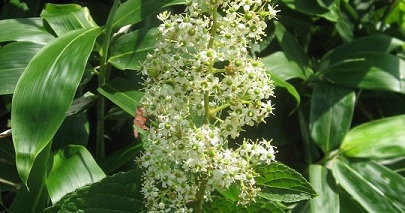Cancer Herbs: Triptolide A Phytochemical Derived From The Tripterygium Wilfordii Plant Can Help Treat Pancreatic Cancer Patients
Source: Cancer Herbs Dec 15, 2020 4 years, 11 months, 2 weeks, 7 hours, 39 minutes ago
Cancer-Herbs: Researchers from the Translational Genomics Research Institute-Phoenix (an affiliate of City of Hope), Baylor Institute for Immunology Research-Dallas and the Salk Institute for Biological Studies-San Diego have in a new study found that a phytochemical derived from the Tripterygium Wilfordii Plant (Commonly called thunder god vine) is able to kill cancer cells and potentially improve clinical outcomes for patients with pancreatic cancer.

The tumor microenvironment in pancreatic ductal adenocarcinoma (PDAC) is highly heterogeneous, fibrotic, and hypovascular, marked by extensive desmoplasia and maintained by the tumor cells, cancer-associated fibroblasts (CAFs) and other stromal cells.
At present there is an urgent need to identify and develop treatment strategies that not only target the tumor cells but can also modulate the stromal cells. A growing number of studies implicate the role of regulatory DNA elements called super-enhancers (SE) in maintaining cell-type-specific gene expression networks in both normal and cancer cells.
Utilizing chromatin activation marks, the study team first mapped SE networks in pancreatic CAFs and epithelial tumor cells and found them to have distinct SE profiles.
Subsequently the team explored the role of triptolide (TPL), a natural compound with antitumor activity, in the context of modulating cell-type-specific SE signatures in PDAC.
The study team found that TPL, cytotoxic to both pancreatic tumor cells and CAFs, disrupted SEs in a manner that resulted in the downregulation of SE-associated genes (e.g., BRD4, MYC, RNA Pol II, and Collagen 1) in both cell types at mRNA and protein levels.
The study findings suggest that TPL acts as a SE interactive agent and may elicit its antitumor activity through SE disruption to re-program cellular cross talk and signaling in PDAC. Based on our findings, epigenetic reprogramming of transcriptional regulation using SE modulating compounds such as TPL may provide means for effective treatment options for pancreatic cancer patients.
The study findings were published in the peer reviewed journal: Oncogenesis.
https://www.nature.com/articles/s41389-020-00285-9
Thunder god vine (Tripterygium Wilfordii) is a vine plant belong to the Celastraceae family. It can be found in Southern China, Northern Thailand , Japan, Korea and Myanmar. In Chinese, it is known as “léi gōng téng.”
The plant has been used in both Thai and Chinese Traditional Medicine for centuries to treat ailments like joint pain, swelling, fever, inflammation and autoimmune diseases such as multiple sclerosis and rheumatoid arthritis.
However it should be only used by experts as the variety of phytochemicals it contains can be toxic if sued wrong and can also cause immunosuppression along with a variety of adverse reactions.
There are more than 107 bioactive phytochemicals in the plant.
The main phytochemical in the plant with medicinal properties is triptolide, a diterpene triepoxide .
Triptolide is the basis of a water-soluble prodrug called Minnelide, w
hich appears to attack pancreatic cancer cells and the cocoon of stroma surrounding the tumor that shields it from the body's immune system.
Triptolide (TPL) has shown promising preclinical antitumor activity against a number of cancers.
https://pubmed.ncbi.nlm.nih.gov/21152873/
https://pubmed.ncbi.nlm.nih.gov/20691980/
https://pubmed.ncbi.nlm.nih.gov/31109340/
It has also demonstrated antitumor activity against pancreatic cancer.
https://pubmed.ncbi.nlm.nih.gov/20013316/
https://stm.sciencemag.org/content/4/156/156ra139.short
https://www.sciencedirect.com/science/article/pii/S0014299920303174
The water-soluble pro-drug of triptolide, Minnelide, was recently reported to show promising activity in patients with gastrointestinal malignancies in Phase I clinical trial.
https://cancerres.aacrjournals.org/content/75/15_Supplement/CT207.short
https://pubmed.ncbi.nlm.nih.gov/26122306/
Multiple mechanisms underlying TPL-induced antitumor activity have been described in the literature including inhibition of NFκB, c-Myc, HSP70 and XPB (ERCC3).
https://pubmed.ncbi.nlm.nih.gov/30975442/
https://pubmed.ncbi.nlm.nih.gov/28543919/
https://pubmed.ncbi.nlm.nih.gov/27775688/
https://pubmed.ncbi.nlm.nih.gov/26503259/
https://pubmed.ncbi.nlm.nih.gov/21278739/
The study team found that the compound's mechanism of action is the ability of triptolide (Minnelide) to disrupt what are known as super-enhancers, strings of DNA needed to maintain the genetic stability of pancreatic cancer cells and the cancer-associated-fibroblasts that help make up the stroma surrounding the cancer.
Dr Haiyong Han, a Professor in TGen's Molecular Medicine Division and one of the study's senior authors told Thailand Medical News, "The cancer cells rely on super-enhancers for their growth and survival."
He added, "We found that by disrupting these super-enhancers triptolide not only attacks the cancer cells, but also the stroma, which helps accelerate cancer cell death.”
Dr Han, who also is head of the basic research unit in TGen's Pancreatic Cancer Program further added, "While triptolide has been known to be a general transcriptional inhibitor and a potent antitumor agent, we are the first to report its role in modulating super-enhancers to regulate the expression of genes, especially cancer-causing genes."
Pancreatic cancer is currently the third leading cause of cancer-related death in the U.S., annually killing more than 47,000 Americans. The global incidence rate is also extremely high.
Dr Daniel Von Hoff, TGen Distinguished Professor and another senior author of the study added, "There is an urgent need to identify and develop treatment strategies that not only target the tumor cells, but can also modulate the stromal cells."
Dr Von Hoff is considered one of the world's leading authorities on pancreatic cancer.
He added, "Based on our findings, using modulating compounds such as triptolide to reprogram super-enhancers may provide means for effective treatment options for pancreas cancer patients.”
The study team concluded, “In summary, we provide compelling evidence that pancreatic CAFs and tumor cells harbor distinct SE networks that are characteristic of their different cell types and states. Based on the disruption of active chromatin marks and concomitant downregulation of SE-associated genes, triptolide might exert its antitumor activity by targeting distinct SE networks in different cells. We propose that epigenetic reprogramming of transcription by exploiting SE modulating compounds like triptolide alone or in combination with the current standard of care may provide more effective treatment options for patients with pancreatic cancer.”
For more on
Cancer-Herbs, keep on logging to Thailand Medical News.
